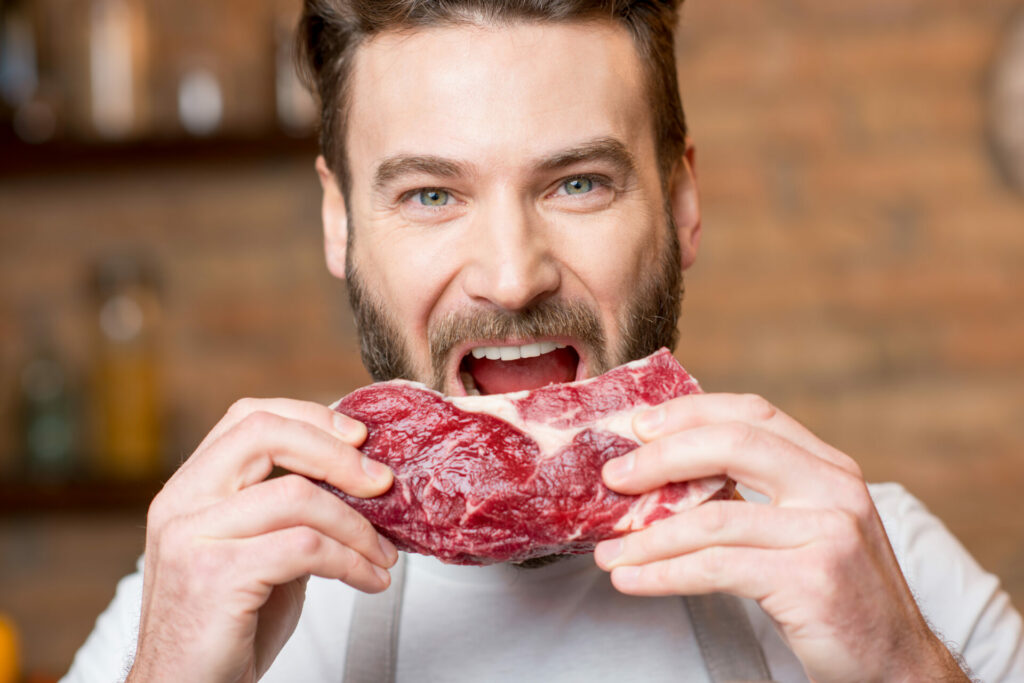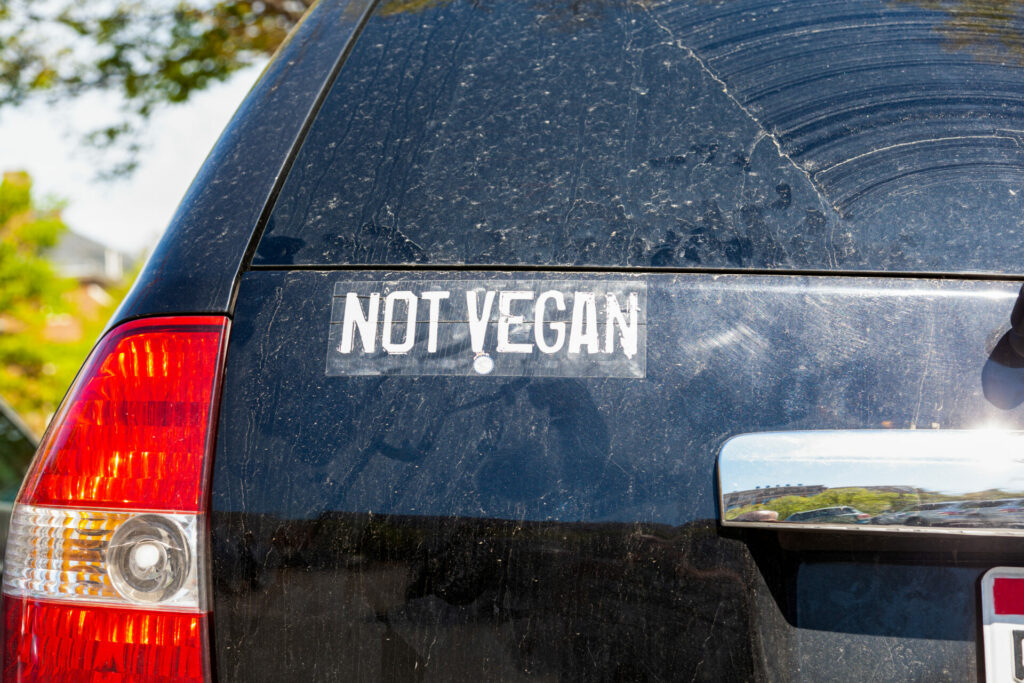Caitlin grimaces as her husband Michel finishes cooking their evening meals. She’s having a vegetable stir fry with brown rice, but carnivore Michel’s fillet steak is so rare, it’s pink. Watching carefully to check Michel doesn’t transfer meat juices to her plate, Caitlin is relieved when she sees he has two sets of servers and wooden spoons.
‘Mealtimes are quite a battleground,’ says Caitlin, 34. ‘Sometimes it’s easier if we just get our own dinners. But Michel likes cooking and he says he doesn’t mind making me vegetarian and vegan food.
‘I became vegetarian just before we got married three years ago, but Michel is a committed carnivore and still talks lovingly about the nights we spent in steakhouses and the barbecues we used to have. I’m now more vegan than vegetarian. Meanwhile, Michel has gone the other way. He’s really got into cycling and swears by protein, which means steaks and other red meat, and plenty of fish, chicken and eggs.’
‘Being vegan isn’t just a diet – it’s often part of a person’s purpose and a big part of their social identity. It’s important to them that they support animal welfare and reduce the environmental footprint’
As couples go, Caitlin and Michel aren’t unusual. Many households now have mixed culinary relationships and the days when we all used to sit down to the same dinner have long gone. While some, like Caitlin, have turned vegetarian and vegan, others might be pescatarian, omnivores or carnivore, like Michel.
Vegan Vs Carnivore

But with a vegan lifestyle now considered healthier for both our health and our planet, this dietary contrast between couples and in households is becoming increasingly common.
More than eight per cent of the world’s population is now vegan – the UAE meets the average. As for vegetarians, India has the highest number – 42 per cent of its population avoid meat products. In the UK 14 per cent – around 7.2 million – people follow a meat-free diet and 43 per cent of Gen Z, those aged between 11 and 26, say they plan to cut meat from their diet this year.
Victoria Tipper, a nutritionist at 2b Limitless in Dubai, says: ‘There has been such an increase in veganism worldwide and stats showed a 600 per cent increase in the number of people following a vegan diet between 2014 and 2018.
‘Being vegan isn’t just a diet – it’s often part of a person’s purpose and a big part of their social identity. It’s important to them that they support animal welfare and reduce the environmental footprint.
‘Veganism is an aspirational choice for many. People now have masses of information from scientists about the vegan diet’s impact on health and its effects on the environment. There’s also a massive increase in vegan food choices in restaurants and supermarkets.
‘There are issues that arise between vegan and carnivore couples whether they’re eating at home or dining out. Many vegans complain their partners don’t understand how traumatic it is when the same utensils are used in a vegan dish as a meat dish’
‘It’s now a much more accessible lifestyle choice than it was years ago. This may play a part in the increasing number of couples where one is vegan and the other a carnivore.’
But while research shows that vegans and vegetarians are up to 12 times more likely than omnivores to choose a partner who excludes animal products, it’s still an issue for many couples living under the same roof, many of who got together decades ago when veganism wasn’t as common.
Mealtime Battleground

Yet it brings with it its own set of problems. For a start, mealtimes are meant to be pleasant and sociable – not a battleground between a vegan and a carnivore about using the same wooden spoon to stir a meaty Bolognese sauce as couscous salad with chickpeas.
There are practical advantages, too. Not only is it less time-consuming for two people living together to eat the same foods, it’s cheaper, creates less waste and is companionable.
‘There are definitely issues that arise between vegan and carnivore couples, whether they’re eating at home or dining out,’ says Victoria.
‘Meal preparation, cooking and cleaning could create many challenges. Many vegans complain their partners don’t understand how traumatic it is when the same utensils are used in a vegan dish as a meat dish.
‘Some vegans won’t kiss a partner if they’ve been eating meat. Over time resentment about the other person’s behaviour can build up and this can be construed as disrespectful.’
Rachael Alexander, a counselling psychologist who is based in the UK, says many people are reluctant to change, especially about something as deeply personal and engrained as what they eat.

‘If you’re the type of person who has stuck to the way you’ve always done things and believe your way is the right way, you might not be flexible enough to cope when the status quo changes,’ explains Rachael.
‘This can cause problems within a relationship if communication isn’t clear. In your own ways, you might both feel misunderstood.’
So how do we cope if we’re a committed vegan, yet we have to see animal products in our fridges, and watch them being cooked and eaten on a daily basis?’ Here at The Ethicalist are our expert’s tips for coping when you’re partner is a carnivore.
Reach A Compromise
Work out a system, suggests Victoria. ‘The meat eater could agree to eat vegan meals some evenings while the omnivore might just agree to eat meat outside the home – for lunch when they’re at work, or if the couple go to a restaurant together.’
Reassure Your Omnivore
Explain your changes, advises Rachael. ‘Sometimes when a person in a relationship makes drastic changes, it causes confusion for the other person,’ she says. ‘They start wondering if they’re enough for the new you and they worry where the changes will end. They might see you joining a vegan cooking class or getting active in animal rights groups and start to feel shut out. Talk to them and explain what you’re doing and why you’re doing it, but also reassure them of your feelings for them.’
Recognise Veganism’s Benefits
Eat more plant-based food, says Victoria. ‘No matter what your lifestyle choices are, we could all use some more plant-based foods in our diets to feed our microbiome,’ she says. ‘It’s all about increasing variety. Ideally we would have about 30 different types of plant-based foods per week. Having days when you supercharge those meals is key. You could try Meatless Mondays as a couple or as a family, for example.’
Change Your Social Life
Mix it up so your time out and about doesn’t always revolve around food, suggests Rachael. ‘It’s easy to get stuck into a rut and always go out for meals as part of your social life,’ she says. ‘But why not add in a few new activities, like bowling, joining a running club or going to see a film or a play? You could go to a concert or join a gym together. This would be a good chance to breathe some new energy into your relationship and put an end to nights out at the same old restaurants.’
Weigh Up Pros And Cons
Take a good, long look at your partner, recommends Rachael. ‘Have a good think about what you love about them, what you like doing together, what you admire in their character and even what makes you laugh and feel loved,’ she suggests. ‘Remind yourself it’s fine if one of you wants to change. But make sure there’s enough between you to stay together.’
Don’t Boss

Don’t let your differences in your culinary choices drive a rift between you, advises Victoria. ‘There have been cases where this polarity in eating styles caused a lot of tension. It led to fewer meals being shared and less quality time together. The basis of any relationship is acceptance of who the other person is, without a need to change them. Telling our partners how to behave rids them of choice and autonomy and demotivates them.’
Shake It Up
If you both love dining out, mix it up, says Rachael. ‘One week go to an Italian restaurant where you know you’ll get a fantastic veggie lasagne, and the next week go for a Chinese where you know the noodles will be super tasty. These days most restaurants are geared towards all tastes. Gone are the days when vegans had to make do with bread or a small salad. Choose places with a range of dietary options.’
Agree Some rules
Get an informal contract in place, suggests Victoria. ‘Work out what you can and can’t do. It might be that you’re willing to cook meat if you don’t have to touch it with your hands, or your partner might be willing to ditch the stuffed chicken breast for a tasty veggie tagine one night a week. Being transparent about what you are willing and not willing to do early on really helps prevent arguments later down the line. Almost like setting a contract around things, this is something that can be reviewed so both parties feel seen and heard.’
Move On

If you really can’t bear to watch your meat-eating mate and you’ve tried everything else, accept you may have to call time on your relationship, says Rachael. ‘It comes down to how much you love them. If being vegan is a fundamental part of your lifestyle and you can’t bear to watch your other half tuck into a juicy burger, a lamb shank or a packet of beef-flavoured crisps, it might be the right time to go your separate ways. You’ve probably grown in different directions, so let them go with love.’
To read more health, relationship and wellbeing articles go to our SELF section.













